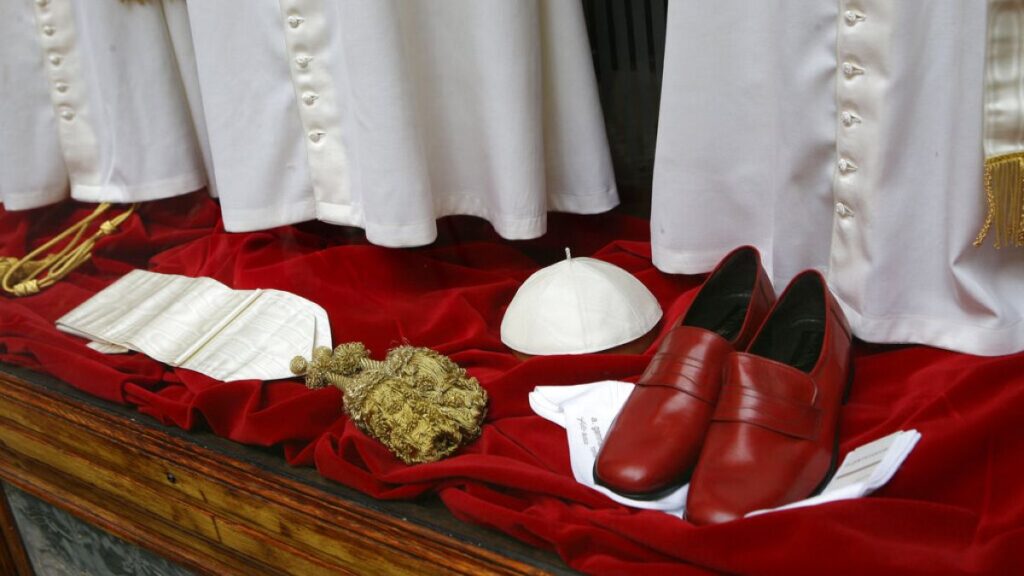“A sobriety of language and presence” – that’s how Filippo Sorcinelli describes Pope Francis, whom he has quietly clothed since the earliest days of his pontificate. The stylist from the Marche region is the founder of the Atelier Lavs, an acronym for Laboratorio Arte Vesti Sacre, which has been working for over twenty years with the Office of Liturgical Celebrations of the Supreme Pontiff.
Sorcinelli, the 49-year-old who specialises in liturgical garments, has made some of the most significant robes of Pope Francis’ ministry, including those worn during his historic pontificate inauguration Mass, broadcast worldwide in 2013.
Even on Pope Francis’ final earthly journey, the visual language of his papacy remained intact. The mitre that adorned him was crafted by Atelier Lavs: a headdress of white silk foil trimmed in traditional gold – a restrained yet radiant symbol of continuity, purity, and timeless beauty.
But, in keeping with Francis’ wishes, nothing new was created for the occasion. The chasuble came from the papal sacristy’s existing wardrobe. Even the mitre was one already in use – emphasising humility over spectacle.
An aesthetic inspired by medieval art to reflect the pope’s soul
Sorcinelli’s creations for Pope Francis have always respected the pontiff’s desire for essentiality and understatement, with sober cuts and subtle symbolism, avoiding any form of ostentation.
When designing the robes for Bergoglio, Sorcinelli explained that he considered Francis’ origins, far from the sumptuous liturgies of central Europe. He sought a more essential visual language, drawing inspiration from Giotto’s medieval fresco cycles, particularly those in Assisi, which express a tangible and direct spirituality.
“My task was to visually recount a pontificate that has always sought to build bridges, not barriers. His robes had to speak the language of encounter,’ Sorcinelli says.
For Pope Francis, the robe has never been a symbol of power, but a sign of service and humility. Far from the baroque garments of other popes, he has always preferred simple lines and natural materials.
In this sense, Atelier Lavs captured not just the ceremonial demands of the papal role, but also the deeper spirit of a pope who, through every gesture – and even through his clothing – sought to bring the Gospel back to the heart of the Church.
Filippo Sorcinelli and the Atelier Lavs: A twenty-year history of prestige
Filippo Sorcinelli grew up in a family of weavers and embroiderers in Jesi, developing a deep passion for fine yarns and ancient weaving techniques from a very young age.
He founded the Atelier in 2002, after having studied sacred art and historical weaving at the Museo del Tessuto in Prato, with the aim of combining the richness of the Italian liturgical tradition with a contemporary language, made of precious natural materials and handmade embroideries.
Over the years the workshop has become a point of reference for bishops and cardinals of major European dioceses, for religious orders such as the Benedictines of Subiaco or the Capuchin Friars Minor, as well as for the solemn patronal festivals of cities such as Assisi, Ravenna and Padua.
Sorcinelli has also curated custom-made vestments for Vatican diplomatic delegations visiting Latin America and Asia.
His work has not gone unnoticed: in 2018, the Diocesan Museum of Milan hosted a retrospective dedicated to the atelier, and in 2021, the Pontifical Liturgical Institute awarded Sorcinelli the ‘Art and Liturgy Prize’ for innovation in the field of sacred vestments, recognising his ability to enhance the rite with a sober aesthetic, attentive to the beauty of detail and the spiritual significance of each thread.
Read the full article here
